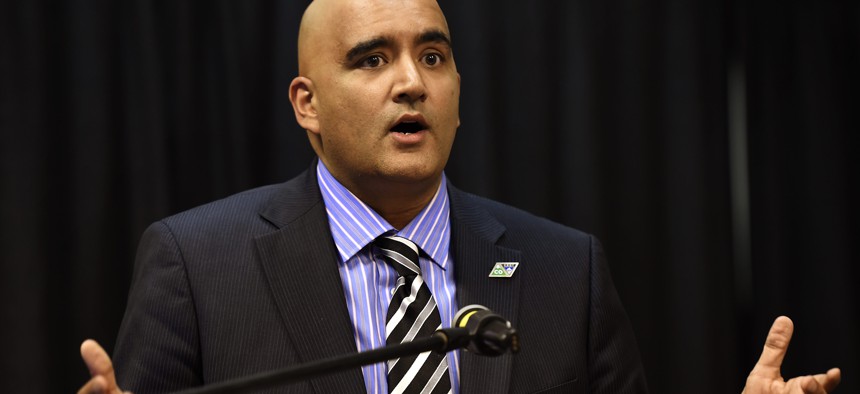Biden’s Pick to Oversee Highways Moves Toward Confirmation

Shailen Bhatt, now President Biden's pick to head the Federal Highway Administration, previously led state transportation departments in Colorado and Delaware. Joe Amon/The Denver Post via Getty Images
Shailen Bhatt previously led state transportation departments in Colorado and Delaware. He’d take the helm of an agency that has drawn flak from Republicans over infrastructure law guidance.
The road to Senate confirmation for Shailen Bhatt, President Biden’s nominee to head the Federal Highway Administration, appears smooth after a committee unanimously voted Tuesday to move forward with his appointment.
The bipartisan vote by the Senate Environment and Public Works Committee is significant, as Republicans have chafed at how the FHWA has overseen the rollout of the $1.2 trillion infrastructure law that Congress passed a year ago.
Bhatt, the former head of state transportation agencies in Colorado and Delaware, would become the first permanent head of the FHWA under Biden. Stephanie Pollack, the former head of the Massachusetts transportation department, currently oversees the federal agency as its deputy administrator.
“President Biden waited a long time – too long – to nominate a leader for this agency,” said U.S. Sen. Shelley Moore Capito of West Virginia. Capito is the top Republican on the committee who helped negotiate the infrastructure law. “This agency needs a Senate-confirmed leader. I have expressed my dissatisfaction and opposition to a number of decisions the FHWA has taken without a Senate-confirmed leader.”
Capito and other Republicans objected to a memo Pollack wrote last year outlining her agency’s preferences in how the federal infrastructure dollars would be spent. The memo, for example, said the agency would favor projects for pedestrians and cyclists, while it would be more skeptical of projects that widened existing highways.
State governments, not federal agencies, determine how the vast majority of federal highway money is spent. Pollack’s guidance indicated the FHWA would work “to the extent allowable under statute” to encourage state agencies to pick projects that matched the Biden administration’s priorities.
The FHWA called on states and other recipients “to invest in projects that upgrade the condition of streets, highways and bridges and make them safe for all users, while at the same time modernizing them so that the transportation network is accessible for all users, provides people with better choices across all modes, accommodates new and emerging technologies, is more sustainable and resilient to a changing climate, and is more equitable.”
Capito pressed Bhatt about the memo during a September hearing. Bhatt didn’t directly discuss the substance of it, but he told the senator that “a lot of the confusion [about the memo] is beginning to abate.”
Transportation Secretary Pete Buttigieg, who oversees many agencies including the FHWA, has reassured state officials that FHWA would follow existing law, Bhatt said. In fact, Bhatt noted, the fact that federal officials signed off on a Maryland proposal to expand the Beltway around Washington, D.C., indicated that FHWA would not block road expansion projects.
“If confirmed, I would want to make sure that, working with our state partners, that they understand that we just want to be consistent in following the law,” Bhatt said in September.
The reassurances seemed to mollify Capito, who cited his comments as she voiced support for his nomination Tuesday. Bhatt also committed to rolling out portions of the infrastructure law that are meant to speed up the federal approval process for infrastructure projects, she said.
“I am supporting Mr. Bhatt’s nomination today because of those commitments and his record of getting things done as a past leader for multiple state departments of transportation,” Capito said.
U.S. Sen. Tom Carper, a Delaware Democrat who chairs the public works committee, praised Bhatt as well. He said Bhatt had “an almost perfect resume” for the job, including a previous stint as an FHWA official under the Obama administration.
While leading the Colorado transportation agency, Bhatt oversaw a major highway widening on a 12-mile stretch of Interstate 25 between Denver and Colorado Springs that was known as “The Gap.” Bhatt opened express lanes on a congested mountain pass. He also oversaw the replacement of a highway viaduct through north Denver with a road in a wider trench that allowed parts of the neighborhood to be reconnected with “caps,” including one that created a park near a school.
But U.S. Sen. John Hickenlooper, a Colorado Democrat who was governor when he hired Bhatt, told committee members earlier that Bhatt was “equally eager to go to Boulder to plan new roadways that incorporated bike paths as he was to travel to our rural San Luis Valley to hear creative proposals to help get agricultural crops to market more quickly.”
Bhatt also noted that, while he ran the Delaware Department of Transportation, the state went from “31st to fourth in bicycle-friendly states.”
Daniel C. Vock is a senior reporter for Route Fifty based in Washington, D.C.
NEXT STORY: Rethinking How to Solve Transit Problems






